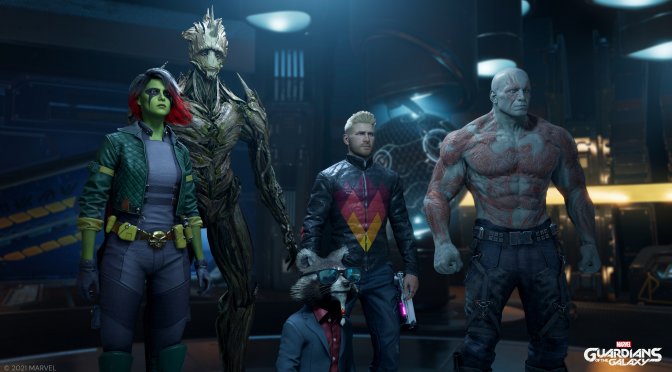Square Enix has revealed the official PC system requirements for Marvel’s Guardians of the Galaxy via its Steam store page. According to the specs, PC gamers will need 150GB of free hard-disk space in order to install it.
Marvel’s Guardians of the Galaxy will invite players to walk a lightyear in Peter Quill’s jet boots and lead his band of misfit heroes-for-hire across the cosmos in search of glory, riches and a way out of whatever mess they’ve gotten themselves into this time.
Marvel’s Guardians of the Galaxy will be a single-player game that – according to its devs – won’t have a DLC or micro-transactions. However, and after what happened with Marvel’s Avengers, we are a bit cautious about this. The game will be also using Denuvo, and will support both Ray Tracing and DLSS.
This new Marvel game will release on October 26th, and below you can find its full PC system requirements.
Marvel’s Guardians of the Galaxy PC Requirements
MINIMUM:
-
- Requires a 64-bit processor and operating system
- OS: Windows® 10 64 bit Build 1803
- Processor: AMD Ryzen™ 5 1400 / Intel® Core™ i5-4460
- Memory: 8 GB RAM
- Graphics: NVIDIA® GeForce® GTX 1060 / AMD Radeon™ RX 570
- DirectX: Version 12
- Storage: 150 GB available space
RECOMMENDED:
-
- Requires a 64-bit processor and operating system
- OS: Windows® 10 64 bit Build 1803
- Processor: AMD Ryzen™ 5 1600 / Intel® Core™ i7-4790
- Memory: 16 GB RAM
- Graphics: NVIDIA® GeForce® GTX 1660 Super / AMD Radeon™ RX 590
- DirectX: Version 12
- Storage: 150 GB available space

John is the founder and Editor in Chief at DSOGaming. He is a PC gaming fan and highly supports the modding and indie communities. Before creating DSOGaming, John worked on numerous gaming websites. While he is a die-hard PC gamer, his gaming roots can be found on consoles. John loved – and still does – the 16-bit consoles, and considers SNES to be one of the best consoles. Still, the PC platform won him over consoles. That was mainly due to 3DFX and its iconic dedicated 3D accelerator graphics card, Voodoo 2. John has also written a higher degree thesis on the “The Evolution of PC graphics cards.”
Contact: Email

